Sergei Skripal - the Russian former spy at centre of poison mystery
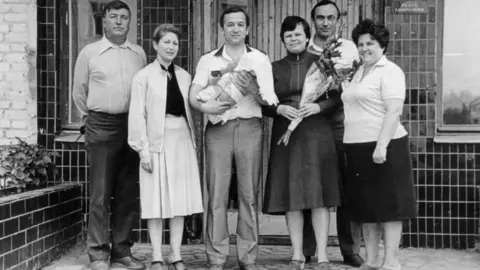 BBC
BBCSergei Skripal, the ex-Russian spy who is fighting for his life after being poisoned in Salisbury, was born in the Soviet Kaliningrad region on 23 June 1951.
It was close enough to the West to pick up the sound of BBC World Service radio broadcasts and friends talk about him recalling the faint sounds.
He was physically strong and chose to join the elite Soviet airborne troop known as the Desantniki.
In 1979, Soviet troops went into Afghanistan and Skripal was one of the first to go in.
After this, he graduated from the Diplomatic Military Academy in Moscow.
There he seems to have been talent spotted by the GRU - Russia's military intelligence - and would embark on the second phase of his life as an intelligence officer.
His initial role in the GRU was in its First Directorate, which focused on spying in Europe.
This gave him the chance to serve overseas for military intelligence under cover as a diplomat.
Friends say he later spoke of this period with excitement, recalling jumping out of a plane in Afghanistan.
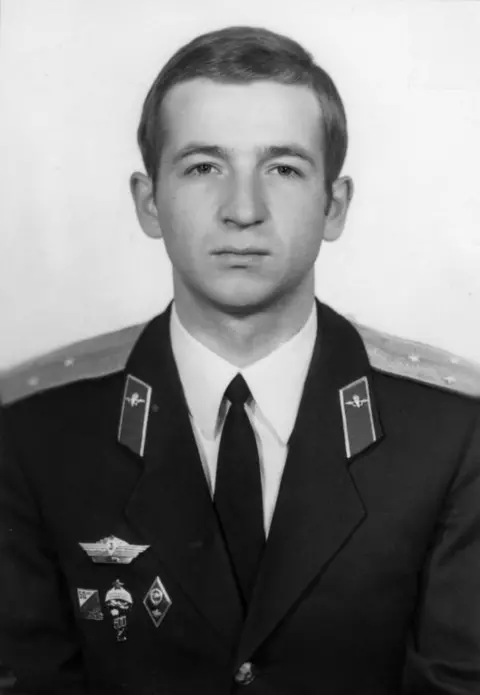
He had two postings in Europe - one in the 1980s and one in the 1990s.
It was during this time that it was alleged that he was approached by British intelligence - beginning the next phase of his career.
It would later be claimed by the authorities that he provided the identities of Russian undercover operatives to the British in return for money.
Spying arrest
In 1999 or 2000 (there is some debate on the date) he quit the GRU.
He was fed up with the corruption, the BBC understands from friends.
He was then believed to have gone to work for Boris Gromov.
Gromov had been the last commander of Soviet forces in Afghanistan who was the last soldier to leave the country, crossing the so-called Friendship Bridge on 15 February 1989.
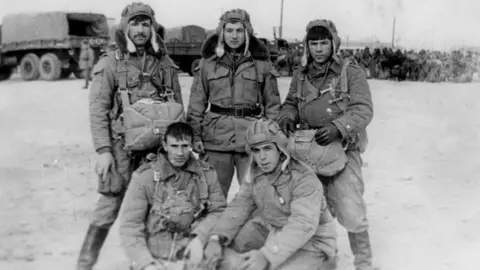
This led to a relatively settled period of Skripal's family life.
He had married Liudmila when they were still young. She had been his teenage sweetheart in Kaliningrad.
Their son Alexander - who was known as Sasha - would be born in 1974 and a daughter, Yulia, in 1984.
Sasha got married and settled into a job, while Yulia was described as the brightest spark in the family and she learnt English.
But in December 2004, the settled family life was shattered when he was arrested for spying.
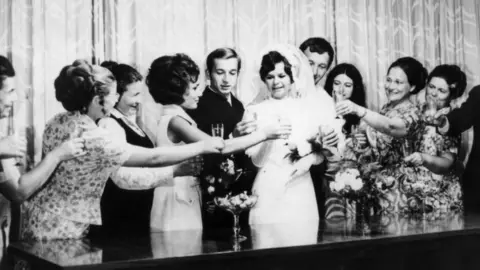
It is claimed that his shoulder was deliberately wrenched from his socket by officers from the Russian security service (FSB) during the arrest.
TV cameras were there to capture the whole event.
He was convicted swiftly in a trial largely closed to the media and sentenced to 13 years in a labour camp - much spent in Mordovia (the same place a member of the Pussy Riot group was imprisoned in 2011).
Reports from those who have been imprisoned there describe tough conditions, but Skripal, friends say, did not succumb.
One advantage was Skripal had been a championship boxer in the Soviet army (explaining his slightly squashed nose).
This proved useful when on remand in Moscow, because it allowed him to deal with a couple of criminals whom he suspected had been paid to make his life difficult.
In the labour camp, even though he was now over 50 years old, he could take the blows from guards and few of the other inmates wanted to take him on.
The period did have its difficulties though.
His son Sasha lost his job and, it is thought, his marriage, because of his father being a convicted spy (something Sergei himself may have felt guilty about).
Move to Salisbury
Suddenly, in July 2010, he was released as part of a major spy swap.
When he had been in prison he had dreamt of ice cream and this was the first thing he wanted to eat.
He was reunited with Liudmila. They decided to set up home in Salisbury because they liked the area, the BBC understands from friends.
He first of all lived in a flat where he was welcomed by neighbours and then moved to the house in a cul-de-sac - the same house that is now a major crime scene for police.
The life of spies after they have defected or are swapped is rarely easy.
Much has been made of one of Britain's most infamous spies, Kim Philby - an MI6 officer who provided its secrets to the Soviet Union's KGB - and his time in Moscow, where he continued to listen to the cricket.
But friends say Skripal was a resilient character who had worked to make the most of the situation.
There have been reports that he may have given the odd lecture about Russia, but there is no outward sign he was involved in any ongoing operational activities.

You might also be interested in:

Any knowledge would have been dated given he had left the GRU in 2000.
Friends instead describe him enjoying the local museums, especially those with a military flavour like the Tank Museum in Bovington, as well as military and nature documentaries (they say he particularly liked David Attenborough).
He was said to have missed Russia.
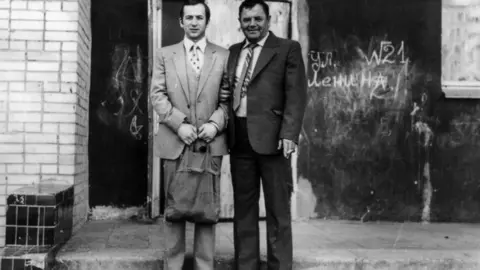
Friends describe him as a patriot who loved his country, but disliked the regime that ran it.
They say he slowly got used to his new surroundings.
Family deaths
Liudmila grew roses in the garden while Sergei liked to barbecue inedible sausages.
But this new life for the couple was short-lived. In 2011, Liudmila was diagnosed with cancer. She died on 23 October 2012.
He would frequently place flowers at her grave.
In July 2017, son Sasha died in St Petersburg while on holiday with a girlfriend.
Family told the BBC he was rushed to the hospital and died of sudden liver failure - they believe it might have been suspicious.
Skripal himself was diagnosed with type 1 diabetes and took insulin daily.
In the summer of 2015, Yulia went back to Moscow, possibly to be with a boyfriend, but kept in touch with her father over Skype.
Sergei's elder brother also died in 2016 after losing weight.
With his family gone, a friend said Sergei made the best of the situation.
He would eat Russian dumplings called Pelmeni while playing World War II tank games on his computer.
Friends say he would have been pleased to see his daughter as she arrived for her recent visit.
It was a visit which would end with both of them lying in a critical condition in hospital beds following their poisoning with a nerve agent.
Skripal once told a close friend that in the darkest days of the labour camp he kept his mind healthy by building a home in his imagination.
His friends hope that same trick may be working for him now as he fights for his life.
